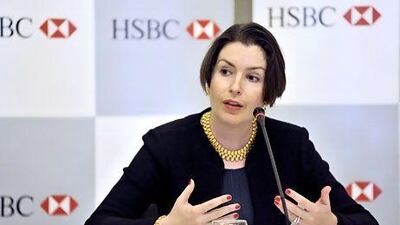Security fears and a lack of awareness are holding back users from taking up internet banking in the region. While a third of the GCC population has registered for online banking, a little over half actually use it to conduct banking services and transactions.
"That is a penetration of about 18 per cent in the region. Penetration in countries like Japan and Canada is higher, beyond the 50 per cent mark," said Francesca McDonagh, the regional head of retail banking and wealth management at HSBC Mena.
"The two prevailing concerns are fear of fraud and a lack of awareness. They are the two big blockers to online backing."
HSBC has conducted its own research across its operations in the UAE, Qatar, Bahrain, Egypt, Lebanon and Jordan to understand why customers have been slower to adopt online banking. Those who do use it regularly prefer the speed, ease and convenience, according to Ms McDonagh, and it becomes the preferred channel to conduct their banking services once they get the hang of it.
According to a report by AT Kearney, online banking has been growing at an average rate of 10 per cent year on year in developed markets, where online banking has become a mature channel and penetration stands at about 50 per cent. In the Scandinavian countries, South Korea and Japan, the penetration is closer to the 70 per cent mark.
Retail banks have been keen to push internet banking in a bid to reduce costs, improve response times and provide better quality service while helping clients save time, says the report.
HSBC is positive that negative perceptions will change in the region and is investing in this space to offer more services online. The bank has already recorded a 60 per cent increase so far this year in internet logins on mobile devices when compared with last year.
"Since the starting point for the GCC is lower, we expect growth to be above 10 per cent," said Ms McDonagh. "We are expecting 11 million logins this year as we invest more in this space."
HSBC recently introduced a secure key device, offering two levels of authentication to help prevent online fraud and add a more secure dimension to internet banking.
"Generally the customer take-up has been positive. Most customers perceive them as empowering them to have the confidence in online banking," said Ms McDonagh.
The growth in internet users across the region is likely to spur on online banking, but users will need to be educated on the potential threats.
"People are moving to the internet quicker now than three to four years ago. Devices are always on and shared. Ownership of security is becoming less clear for individuals," said Justin Doo, the security practice director of Middle East and French-speaking Africa at Symantec. "When customers connect to their bank, it needs to be quick and intuitive. People are concerned about moving to the online world because they don't always understand the threats."
Secure key devices are algorithm-based, providing a unique code every 30 seconds.
"It is like encryption, it can be hacked and cracked but would need some very high-powered computing to do it and a lot of time. If you had access to those resources, you would probably use it to target something bigger, rather than individuals," said Mr Doo.

